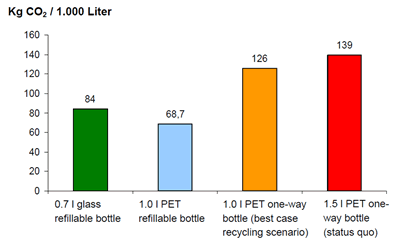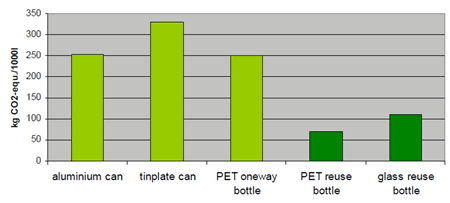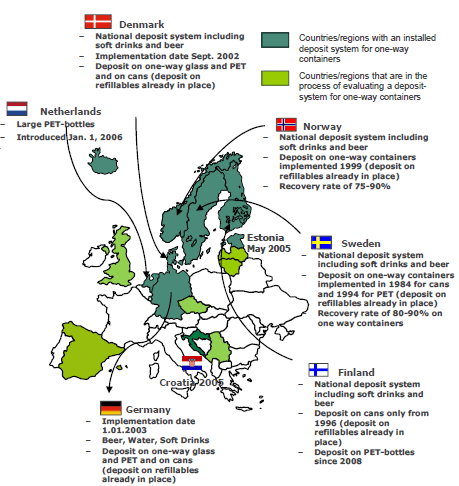Beverage packaging and Zero Waste

Throwing bottles and other beverage packaging in the bin? What a waste of resources and money! In a Zero Waste society all beverage container would be refilled many times before it would be recycled into a new container.
Not many decades ago beverages were generally bottled in refillable containers with deposits. Deposits are a sum of money we give as security for an item acquired for temporary use, once we give back the item we get back the money. In the last decades and years, this has changed; the trend goes towards throw-away one-way packaging. This is a very inefficient way of using resources.
There are three ways to deal with beverage packaging:
- Refilling (normally with deposit)– bottles/cans are used by the customer, transported back to the filler (producer), rinsed, refilled and transported back to the customer for use. Refillable glass bottles can be refilled over 50 times, refillable PET-bottles up to 15 times. The result is zero litter, minimum environmental impact and considerable cost savings for the municipalities.
- One-way deposit – bottles/cans are used by the customer only once, the producer can get back the materials or they will go directly to the recycling company that will produce brand new bottles which then need to be refilled and transported back to the customer. Zero litter but higher environmental impact.
- One-way without deposit – bottles/cans are used by the customer, the producer –in the best case- will pay a fee to an organisation to handle the waste or will just have nothing to do with their product once it becomes waste. The public authorities will bear the costs and a good amount of the beverages will need to be landfilled or burnt. High litter, high environmental impact but cheapest option for the producers.
Life cycle analyses (LCA) carried out by the German Environmental Protection Agency prove the significant negative environmental impacts of one-way systems regarding material (resource) consumption, energy consumption, global warming potential, acidification, ground level ozone and eutrophication compared to environmentally friendly refillables systems.

A recent LCA from the IFEU Institute shows that refillable bottles have 50-60% lower global warming potential than one-way beverage containers.
For instance, using only refillable bottles for all non-alcoholic beverages in Germany compared to the use of one-way packaging (100% refillables vs. 100% one-way packaging) could annually reduce the global warming emissions with 1.26 million tonnes CO2 equivalents (see figure).
The EU Packaging Directive (2004/12/EC) required recycling of beverage packaging of 50% of metal, 22,5% plastics and 60% of glass for 2008. Some member states decided to pass national legislation on deposit schemes which helped to largely accomplish the targets and reach collection rates above 80% (Germany, Scandinavia…) some others opted for other approaches without deposit which, lacking the right incentive, failed to deliver good results (Spain, France…).
Deposit systems allow for high collection rates and high quality of material which allows containers to be recycled into both food and non food applications – even bottle to bottle recycling. This makes it possible to use recycled instead of virgin material and reduces the need for extraction of new natural resources.

But deposit systems are not only good for the environment and an excellent tool to implement Extended Producer Responsibility, they also save lots of money to the municipalities by lowering the volume of household waste to be managed (in some cases up to 50%!), reducing the pick-up frequency, reducing the need for sorting and disposal facilities such as incinerators and landfills and by reducing the need for street cleaning. Less cost for the municipalities means less cost for the tax-payers! A win-win situation.
Good practices in Europe:
GERMANY
Germany had a well-functioning market for refillables until the 1990s when the refillable quota fell below 72% for the first time. This triggered the introduction of a mandatory one-way deposit system in 2003.
The deposit value was and is of 25 eurocent and it was applied to one-way deposit that included from non-carbonated to alcoholic mixture drinks, the only beverages excluded from the one-way deposit system being milk products, fruit and vegetable juices as well as dietetic products directly designed for babies.
Results
The introduction of the deposit on one-way beverage packaging was a big success with 98,5% of refillable bottles being returned by consumers–highest in the world.
The quality of the recovered material is good enough to guarantee that an old bottle will become a new bottle.
Zero littering of one-way beverages. The value of the containers has helped remove 1-2 billion one-way containers from Germany´s bins and streets.
Finally it had a good steering effect on some refillables’ markets such as beer containers.
SWEDEN
The deposit system was introduced in 1984 for cans and 1994 for PET plastic bottles for one-way containers and it has reached recovery rates of 86% for cans and 77% for PET. The recovery company Returpack announced an increase in the deposit on metal drinks cans to 11 eurocents (1SKr).
As we can see in the picture the deposit system is being implemented in more and more countries in Europe and some are considering its introduction.
To summarise; modern deposit-refund systems for one-way beverage containers are working and can be designed to operate at insignificant cost (from €0c – €1c per packaging unit) while ensuring collection and recovery rates above 80% the challenge is how to move from one-way take-back system to a system that maximises refilling.
A Zero Waste system implies eliminating waste from beverage packaging and a system of deposit for refillable bottles is the best way to reduce not only waste but also the extraction of raw materials. If Europe is to be sustainable in the future we need to advance towards a system of refillable beverage packaging, just like it always worked!
